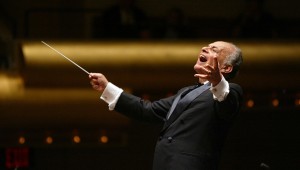MEMORIAL A Tribute to Maestro Lorin Maazel
In summer 2010 I was engaged to perform at the Castleton Festival, Rappahannock, Virginia, USA. Beginning then, I had the great fortune to play as principal cello in opera and symphonic performances under the late Maestro Lorin Maazel, who founded the Festival with his wife, Dietlinde Turban-Maazel, in 2009. The idea for Castleton was that young professionals would come to the Maestro’s 600 acre property in the foothills of the Shenandoah mountains to perform for a month during the summer.
Over the next five seasons, I was able to be a part of the most magnificent and rewarding rehearsals and concerts in my life.
Maestro Lorin Maazel died Sunday 13th July 2014. As strange coincidence would have it, that very afternoon the Castleton Festival Orchestra was scheduled to perform a concert with three of his compositions on the program. I had been asked to play the solo violoncello part in his work ‘The Giving Tree’ (it was to be narrated by Dietlinde Maazel, but at the last minute because of her husband’s death that morning she was replaced by actress Maria Tucci).
Playing as soloist mere hours after his death with his whole family in the front row in the splendid theatre he had built on his own property was an enormously intense experience. We were fortunate to have the very talented young conductor Kensho Watanabe expertly leading us in this piece. Instead of playing Maestro Maazel’s music with him conducting, as was originally planned, suddenly all of the performers were thrust into a tribute to Maestro.
That Maestro Maazel was one of the great gifts to the music world and the larger cultural world of the past century is obvious; what might be less so was his commitment to the future of our profession. He did not simply say he cared about the future after his death as some casually do– he truly did care and provided for the future by creating a place on his farm in rural Virginia where young professionals could come and work with him daily preparing operas and symphonic concerts to his exacting standards. The Castleton Festival has affected so many people deeply, and the fact that it will go on is testament to the sincerity and vitality of the Maestro’s grand dream.
Unlike other festivals where big-name conductors jet in for a dress rehearsal and concert, Maestro Maazel conducted almost every single rehearsal and performance up until this summer. Often one would spend five hours daily with him. His rehearsals were a marvel of efficiency, his knowledge and expressive abilities supreme. He consistently inspired everyone around him to reach for the highest musical ideals, discounting all outside forces.
I am indeed fortunate not only to have played with him for the past five summers, but also to have been given the opportunity to play some of the great operatic ‘cello solos. The ‘cello solo at the end of Act I of ‘Otello’ is engraved in my memory– he was so linked to the singers and orchestra at the same time that he made the solo ‘cello line seem as if it were bound to the love of Desdemona and Otello.
Every gesture he made had musical significance. The ending of ‘Il Tabarro’ brought out a terror and desperation in his face that was shocking– it was as if he was witnessing the murder in real life. His treatment of the overture to ‘Il Barbiere di Siviglia’ was utterly unique. He brought out as much passion from a simple violin scale in a so-called “light” overture as he did from intense Puccini moments. His face and hands perfectly projected each moment in a given work; he was so beautiful and interesting to watch conduct one could hardly look away!
I also got to know him personally over the years. Last March after a chamber performance I spent a long four hour afternoon with him and my colleague violinist Eric Silberger talking, listening to him tell stories, watching videos on Youtube and listening to Sarah Vaughan sing ‘Poor Butterfly.’ It revealed a side of the man that was most warm, open, affectionate, witty, and totally engaged with us the entire time.
When I saw him first this summer, looking thinner and a little tired, he said “If only we could play duets together, even just the Handel/Halvorsen duo” (He, a super violinist, used to play that piece with the late cellist Janos Starker at Castleton Farms, Virginia).
He elevated music making to incredible heights. When he looked up into the sky with both arms outstretched, holding a fermata longer than anyone thought possible, and somehow bringing everyone up with him and down again, together!– that was magic.
Maestro Maazel lives on through those who worked with him, particularly in the last years at the Castleton Festival, which was the love of his life. We will, as he often said, carry the torch– and his torch is the brightest of them all.
Long live the legacy and memory of Maestro Lorin Maazel.
*Daniel Lelchuk is principal cellist of the Castleton Festival and Assistant Principal cellist of the Louisiana Philharmonic Orchestra

